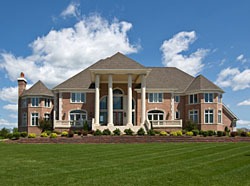
If you are in the market for a home priced over $417,000, you are in jumbo loan territory - where the loans are large and the interest rates are high.
When a Regular Loan Goes Jumbo
So, what is a jumbo loan? Any residential or commercial mortgage with a loan amount greater than loan limits set each year by Fannie Mae (FNMA - Federal National Mortgage Association) and Freddie Mac (FHLMC - Federal Home Loan Mortgage Corporation). These two quasi-government home loan agencies determine the cap at which a traditional, or conforming, loan ends and a jumbo begins. The conforming loan limit, or "jumbo loan amount" is set every January. The 2007 limit for single-family homes and condominiums is $417,000.
Jumbo Loans Come with Higher Interest Rates and Higher Risk
Jumbo loans can be fixed rate mortgages, adjutable rate mortgages, or even FHA loans. Though jumbo loans can take the form of any of these more common mortgages, they almost always carry higher rates - usually a quarter to half of a percent higher than conventional loans.
But why would bigger mortgages come with higher interest rates? It seems like it should be the other way around; buy a bigger house, and get a better rate. The answer is not so much about quantity or even quality as it is about risk.
Fannie Mae and Freddie Mac purchase the majority of mortgages from various lenders across the country. These mortgages are packaged together and resold to investors large and small. Jumbo loans are more difficult than conventional loans to bundle and resell to investors. If the borrower of a jumbo loan defaults on that mortgage, the larger luxury residence is harder to sell quickly for full price.
The financial mainstream of America does not buy large luxury homes. These larger residences have a smaller market, appeal more subjectively to borrowers than homes with conventional loans (one million-dollar home is more likely to be completely different than the next, limiting the market even further), and luxury prices are more suseptable to market fluctuations. To cover the risk, the interest rate carried by a jumbo loan is usually higher than a confomring loan.
When Jumbo Isn't Enough
Even jumbo loans have limits - which is currently set at $650,000. Need a larger loan? Introducing the the super jumbo loan. With mortgage amounts exceeding millions of dollars, large investors handle these mortgages when smaller investors dare not.
When Two Loans Are Less than One
If you are considering a home loan that is close to the limit of a conforming mortage amount, you might be able to work with your bank to let you take out two simultaneous loans. With neither loan exceeding the limit, you can avoid the higher rates of a jumbo mortgage. One loan could act as your primary mortgage with the bulk of the borrowed amount, and a second smaller loan could make up the difference. The smaller loan will probably come with a higher intereste rate. Nonetheless, the savings gained with a rate even slightly less than a jumbo rate can really ad up - especially over the life of the loan.
Related Articles
- Tips On Buying a Home
- A Guide for First Time Homebuyers
- First Time Homebuyer Financial Assistance
- Do You Qualify for an FHA Loan?
- Energy Efficient FHA Mortgages
- FAQs About Buying HUD Homes
 Print
Print Email
Email







